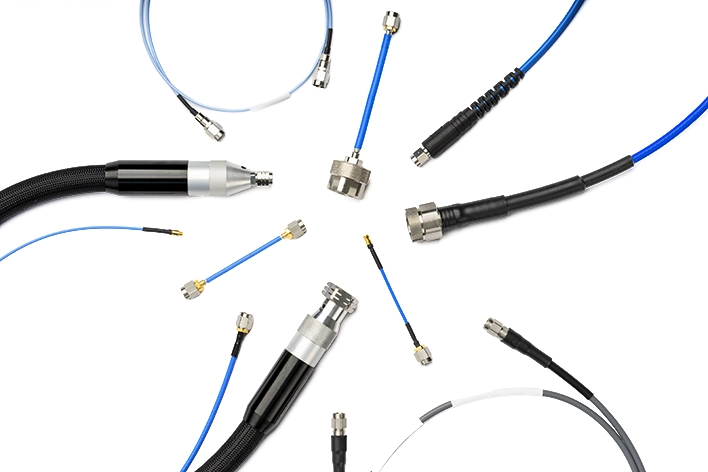RF Coaxial Cables
System Interconnect Cables and Precision Test Leads
Mini-Circuits suite of RF cable solutions is built for precision, performance, and versatility. Our RF/microwave interconnect and precision test cables are available for 50-Ohm and 75-Ohm systems, covering frequencies from DC to 110 GHz. With connector options including SMA, N-Type, F-Type, BNC, and 2.92mm, we provide unmatched flexibility cross applications.
- Available in male and female connector combinations
- Connector formats: straight, right angle, bulkhead, quick-connect
- Engineered to deliver high reliability under demanding test and field conditions
- Custom RF cable assemblies available to meet specific design requirements

Whether you're building test environments, connecting critical system components, or configuring high-frequency signal chains, Mini-Circuits' RF cables give you the precision and confidence you need.
Shop RF Cables Today
Mini-Circuits is a global leader in high-performance RF cables. Our selection includes standard and custom RF coax cables engineered for reliability, low signal loss, and long service life. Whether you're looking for an SMA RF cable, RF coaxial cable for test equipment, or a specialized radio frequency cable for a mission-critical system, Mini-Circuits has the solution.

Markets and Industries We Supply
Mini-Circuits serves customers across multiple industries that rely on radio frequency cable performance:
- Telecommunications: 5G infrastructure, backhaul, and wireless communication setups
- Aerospace & Defense: Radar, electronic warfare, and navigation systems
- Medical Devices: Imaging and monitoring devices that transmit RF data
- Automotive: Advanced driver-assistance systems (ADAS), radar, and vehicle connectivity
- Industrial IoT: RF cable types support machine-to-machine (M2M) communication in factory automation
- Consumer Electronics: From wearables to smart TVs, RF interconnects are embedded in signal pathways
Mini-Circuits offers both standard and custom RF coaxial cable assemblies to meet the needs of each industry.
Frequently Asked Power Sensor Questions
What is an RF Cable?
RF cables, or radio frequency cables, are essential for transmitting high-frequency signals between different components in an electronic system. Common uses include:
- Connecting antennas to receivers or transmitters
- Routing signals between test equipment and DUTs (devices under test)
- Integrating RF modules in communications and radar systems
- Supporting signal paths in 5G, IoT, and satellite applications
Whether for test benches or deployed systems, the right RF cable ensures signal integrity, low loss, and consistent performance.
Which Products Typically Include RF Cables?
RF cables are found in a wide variety of commercial and industrial systems. Products and assemblies that typically include an RF cable or RF coax cable are:
- Test and measurement insturments
- RF signal generators and analyzersWireless base stations and repeaters
- Satellite communications systems
- Military and aerospace electronics
- IoT devices and wireless sensor networks
These systems require dependable connections that support the necessary bandwidth, shielding, and mechanical durability
How Do I Use an RF Cable?
Using an RF cable involves proper matching of cable type, length, and connector to your specific application:
- Determine system impedance: Choose between 50-Ohm or 75-Ohm RF coaxial cable depending on system design.
- Select the right connectors: Match male/female and connector types such as SMA, N-Type, or BNC.
- Consider form factor: Use a right angle RF cable connector in tight spaces; opt for straight connectors for direct paths.
- Manage cable routing: Avoid sharp bends or crimping. Use strain reliefs where needed.
- Verify signal performance: Choose precision test leads when measurement accuracy is critical.
Each Mini-Circuits cable is tested for performance across its full frequency range and environmental conditions.
Which RF Cable is Right For Me?
Choosing the right RF cable depends on several factors:
- Frequency range: Ensure the cable supports your system’s bandwidth. Mini-Circuitscables perform up to 110 GHz.
- Connector type: Options include SMA RF cable, N-Type, BNC, 2.92mm, and more.
- Mechanical constraints: Use right angle RF cable connectors for limited-spaceinstallations.
- Flexibility and durability: Consider ruggedized options for field use.
- Precision requirements: Opt for low-loss, phase-stable cables for testenvironments.
What is the difference between system interconnect cables and precision test leads?
System interconnect cables are used for permanent or semi-permanent installation in RF systems. They are optimized for durability and consistent performance. Precision test leads are used in lab and production environments where accurate signal measurement is critical. These cables are designed for low insertion loss, phase stability, and repeatable measurements.
What should I know about the customer cable build?
Mini-Circuits supports custom RF cable assemblies to match specific length, frequency, shielding, and connector requirements. Our team can help you configure your cable build with precise specs, including options for thermal performance and environmental sealing.
When do I need a straight, right-angle, bulkhead, or quick-connect radio frequency cables?
- Straight connectors: Best for low-profile, direct connections.
- Right-angle connectors: Ideal for tight spaces and bend-limited environments.
Bulkhead connectors: Useful for panel-mount or through-wall cable entry.
Quick-connect: Designed for frequent connect/disconnect scenarios.
Each format is available across our line of RF coaxial cable assemblies.





